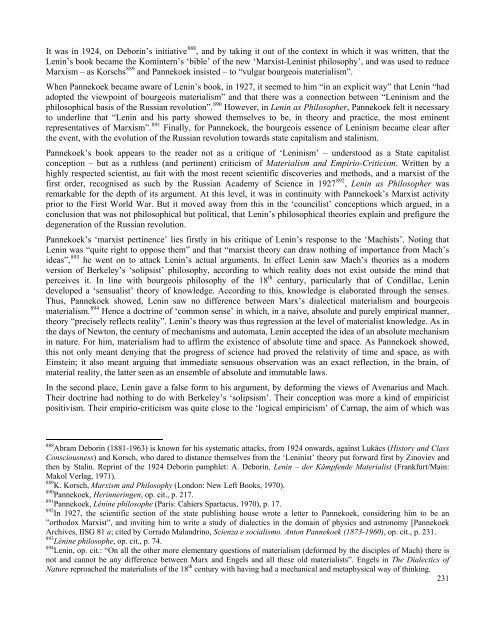The German-Dutch Communist Left - Libcom
The German-Dutch Communist Left - Libcom
The German-Dutch Communist Left - Libcom
You also want an ePaper? Increase the reach of your titles
YUMPU automatically turns print PDFs into web optimized ePapers that Google loves.
It was in 1924, on Deborin’s initiative 888 , and by taking it out of the context in which it was written, that the<br />
Lenin’s book became the Komintern’s ‘bible’ of the new ‘Marxist-Leninist philosophy’, and was used to reduce<br />
Marxism – as Korschs 889 and Pannekoek insisted – to “vulgar bourgeois materialism”.<br />
When Pannekoek became aware of Lenin’s book, in 1927, it seemed to him “in an explicit way” that Lenin “had<br />
adopted the viewpoint of bourgeois materialism” and that there was a connection between “Leninism and the<br />
philosophical basis of the Russian revolution”. 890 However, in Lenin as Philosopher, Pannekoek felt it necessary<br />
to underline that “Lenin and his party showed themselves to be, in theory and practice, the most eminent<br />
representatives of Marxism”. 891 Finally, for Pannekoek, the bourgeois essence of Leninism became clear after<br />
the event, with the evolution of the Russian revolution towards state capitalism and stalinism.<br />
Pannekoek’s book appears to the reader not as a critique of ‘Leninism’ – understood as a State capitalist<br />
conception – but as a ruthless (and pertinent) criticism of Materialism and Empirio-Criticism. Written by a<br />
highly respected scientist, au fait with the most recent scientific discoveries and methods, and a marxist of the<br />
first order, recognised as such by the Russian Academy of Science in 1927 892 , Lenin as Philosopher was<br />
remarkable for the depth of its argument. At this level, it was in continuity with Pannekoek’s Marxist activity<br />
prior to the First World War. But it moved away from this in the ‘councilist’ conceptions which argued, in a<br />
conclusion that was not philosophical but political, that Lenin’s philosophical theories explain and prefigure the<br />
degeneration of the Russian revolution.<br />
Pannekoek’s ‘marxist pertinence’ lies firstly in his critique of Lenin’s response to the ‘Machists’. Noting that<br />
Lenin was “quite right to oppose them” and that “marxist theory can draw nothing of importance from Mach’s<br />
ideas”, 893 he went on to attack Lenin’s actual arguments. In effect Lenin saw Mach’s theories as a modern<br />
version of Berkeley’s ‘solipsist’ philosophy, according to which reality does not exist outside the mind that<br />
perceives it. In line with bourgeois philosophy of the 18 th century, particularly that of Condillac, Lenin<br />
developed a ‘sensualist’ theory of knowledge. According to this, knowledge is elaborated through the senses.<br />
Thus, Pannekoek showed, Lenin saw no difference between Marx’s dialectical materialism and bourgeois<br />
materialism. 894 Hence a doctrine of ‘common sense’ in which, in a naive, absolute and purely empirical manner,<br />
theory “precisely reflects reality”. Lenin’s theory was thus regression at the level of materialist knowledge. As in<br />
the days of Newton, the century of mechanisms and automata, Lenin accepted the idea of an absolute mechanism<br />
in nature. For him, materialism had to affirm the existence of absolute time and space. As Pannekoek showed,<br />
this not only meant denying that the progress of science had proved the relativity of time and space, as with<br />
Einstein; it also meant arguing that immediate sensuous observation was an exact reflection, in the brain, of<br />
material reality, the latter seen as an ensemble of absolute and immutable laws.<br />
In the second place, Lenin gave a false form to his argument, by deforming the views of Avenarius and Mach.<br />
<strong>The</strong>ir doctrine had nothing to do with Berkeley’s ‘solipsism’. <strong>The</strong>ir conception was more a kind of empiricist<br />
positivism. <strong>The</strong>ir empirio-criticism was quite close to the ‘logical empiricism’ of Carnap, the aim of which was<br />
888 Abram Deborin (1881-1963) is known for his systematic attacks, from 1924 onwards, against Lukács (History and Class<br />
Consciousness) and Korsch, who dared to distance themselves from the ‘Leninist’ theory put forward first by Zinoviev and<br />
then by Stalin. Reprint of the 1924 Deborin pamphlet: A. Deborin, Lenin – der Kämpfende Materialist (Frankfurt/Main:<br />
Makol Verlag, 1971).<br />
889 K. Korsch, Marxism and Philosophy (London: New <strong>Left</strong> Books, 1970).<br />
890 Pannekoek, Herinneringen, op. cit., p. 217.<br />
891 Pannekoek, Lénine philosophe (Paris: Cahiers Spartacus, 1970), p. 17.<br />
892 In 1927, the scientific section of the state publishing house wrote a letter to Pannekoek, considering him to be an<br />
”orthodox Marxist”, and inviting him to write a study of dialectics in the domain of physics and astronomy [Pannekoek<br />
Archives, IISG 81 a; cited by Corrado Malandrino, Scienza e socialismo. Anton Pannekoek (1873-1960), op. cit., p. 231.<br />
893 Lénine philosophe, op. cit., p. 74.<br />
894 Lenin, op. cit.: “On all the other more elementary questions of materialism (deformed by the disciples of Mach) there is<br />
not and cannot be any difference between Marx and Engels and all these old materialists”. Engels in <strong>The</strong> Dialectics of<br />
Nature reproached the materialists of the 18 th century with having had a mechanical and metaphysical way of thinking.<br />
231
















